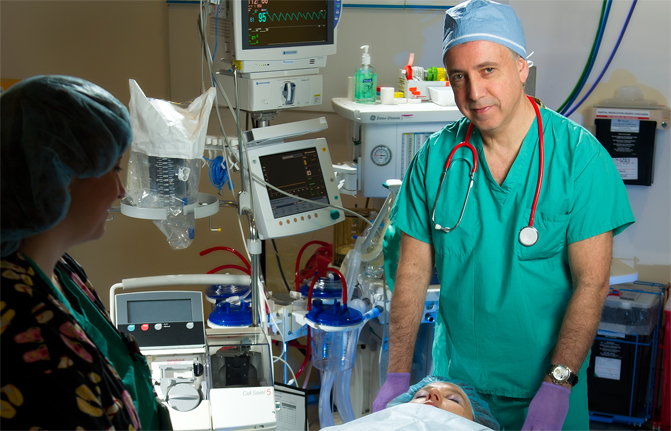The Bloodless Alternative
For those who prefer it that way, surgery can now be performed safely without transfusions.

When Kisha hairston, a 41-year-old homemaker from Piscataway, needed a hysterectomy this past March, she had to decide where to have it done based on a special requirement. Hairston is a Jehovah’s Witness; her religion bars her from using blood products, so she needed to find a hospital that could do her surgery without the need for transfusions. She had to look no further than Saint Peter’s University Hospital. To meet the religious, medical and personal beliefs of patients who opt not to have transfusions, Saint Peter’s has launched a bloodless medicine and surgery program.
Patients decline to receive blood or blood products during medical treatment, especially surgery, for various reasons. Some object due to religious beliefs, while for others it is simply a personal preference, sometimes based on a wish to be absolutely certain of avoiding blood-borne infections or other risks of blood transfusions.
Hairston learned about the Saint Peter’s program from her doctor and met with Marcie Colon, the program coordinator. “We discussed my options, and she respected the care that I wanted,” Hairston says. “It boosted my confidence that the medical field has become more open-minded. I told Ms. Colon I appreciated how she made me feel.”
Along with the bloodless surgery option, says Howard Lakritz, M.D., director of the program and chairman of Anesthesiology at Saint Peter’s, has come increased attention to prudent “blood management, which will benefit the majority of patients.” As he explains, that means using transfusions sparingly with all patients, only when absolutely necessary. Prompted by the challenge of serving the Jehovah’s Witness population and others who reject transfusions, he explains, medical researchers have learned more about optimizing safety for all of us in the handling of blood.
It’s true that complications are very rare—blood used for transfusion is safer than ever, says Dr. Lakritz—but they do occur, and they can lengthen hospital stays and add to recovery time. “In the operating room we now have strategies to reduce blood loss with medications and surgical techniques,” says the doctor, “and we can ‘self-salvage’ blood—that is, use a person’s own blood that is suctioned, filtered and returned to the body.”
Patients interested in the bloodless surgery program at Saint Peter’s University Hospital meet with Colon to discuss the options available to them. “I then make certain the medical team is informed and aware of those wishes, and I work with the team to honor them,” she says.
Hairston recalls that before her surgery, her doctors came in to tell her they knew of her preferences and would abide by them. “That really took a load off my mind,” she says. “I am very satisfied with the care given to me. From meeting Ms. Colon prior to surgery through admittance, being prepped and after surgery, the whole experience was very satisfactory in my book.” —D.L.


